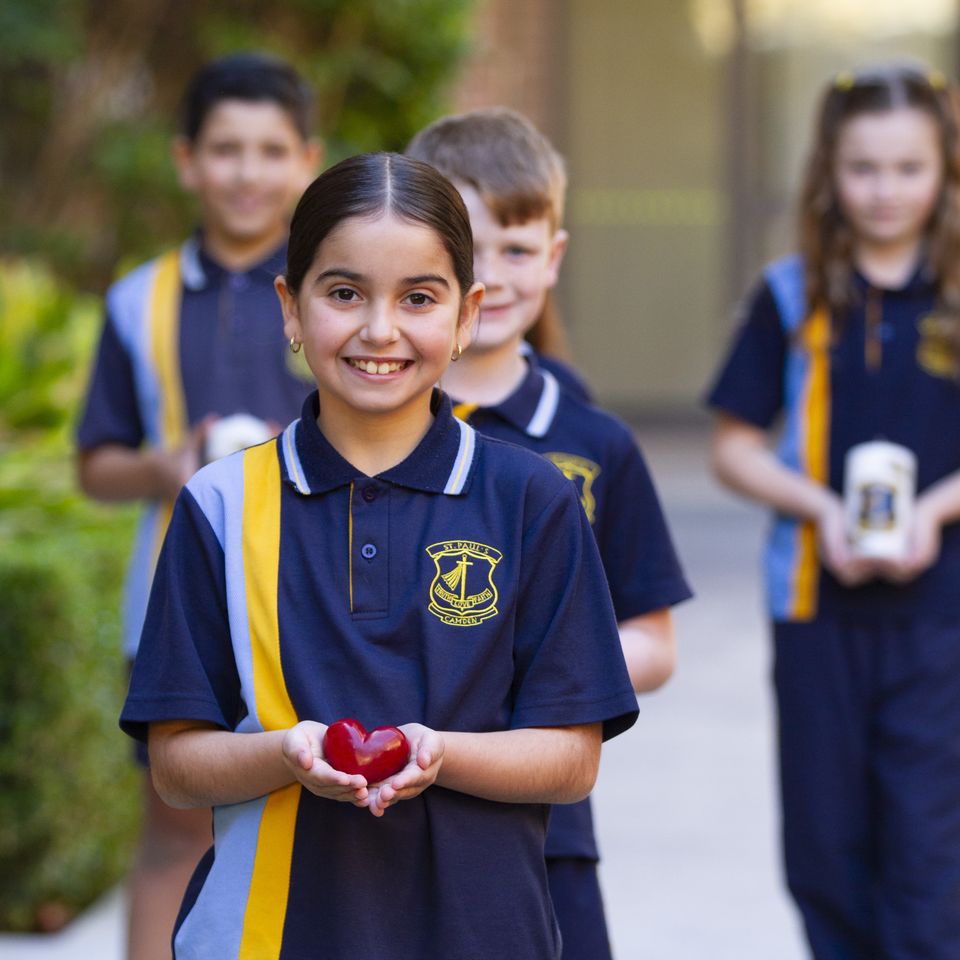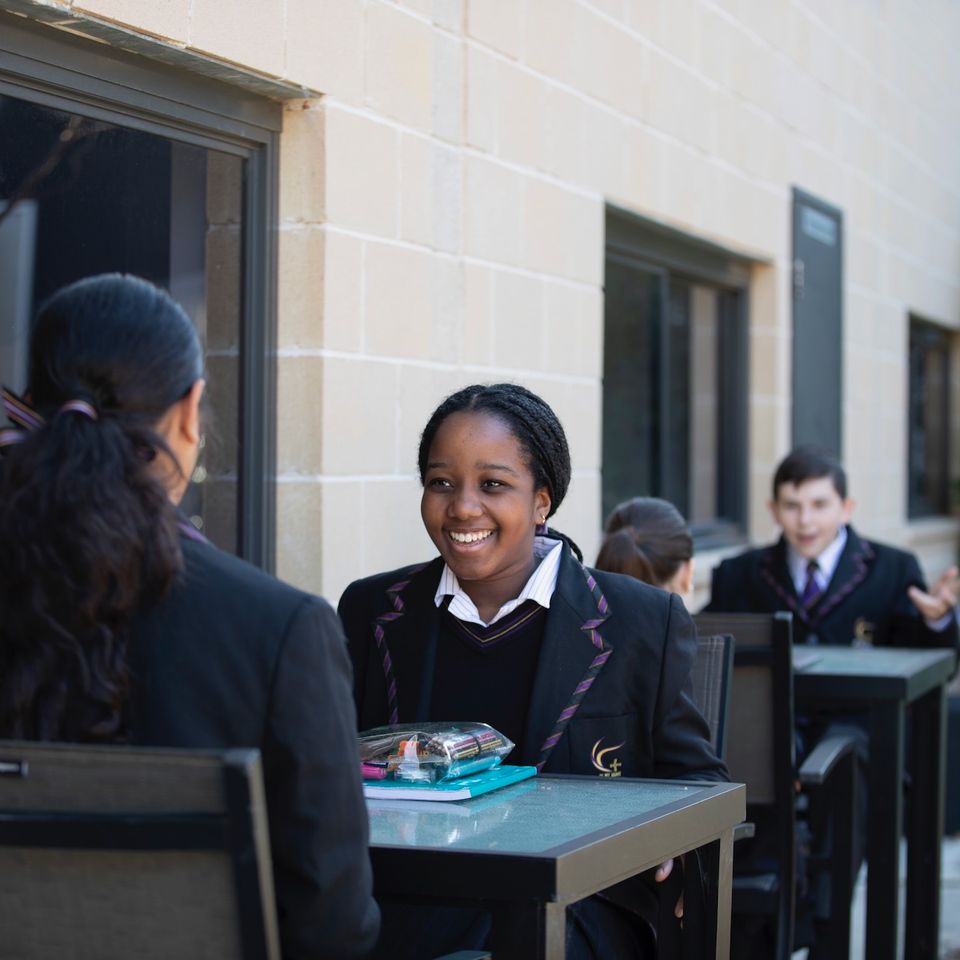
You’ll find all this and more at a Catholic school.

You’ll find all this and more at a Catholic school.
Every child and young person has the right to learn, the ability to achieve great things, and the responsibility to use their talents to make the world a better place. Through our diverse curriculum, we’re making this vision a reality for more than 20,000 students each year.
Catholic schools are well known for their emphasis on academic achievement and excellence. That’s because students thrive when they know someone believes in them, has high (and achievable) expectations of them, and provides the challenge and support they need to learn and grow.
Our approach to education is about helping each student become the kind of person they want to be—with an understanding of who they are, why they matter, and how they can apply what they learn to make a positive difference to their life and the lives of others.
We combine delivery of the NSW Curriculum with a rigorous Religious Education syllabus and the application of a Catholic worldview across all subjects.

Students don’t separate their learning from their wellbeing, or their spirituality from who they are on the field or stage. Our teachers and support staff take a holistic approach, fostering rigour in all aspects of school life, from academics to faith formation, while ensuring it's relevant to students' lives and the world around them.
Why Catholic education?
We create a supportive environment where students can take ownership of their learning and feel safe to try and fail. By balancing ambitious goal setting with access to the resources and opportunities they need to be successful, our schools challenge and empower students to grow in their faith, learning, and wellbeing.
Learn moreThroughout their Catholic school experience, students benefit from differentiated teaching and learning that adapts and grows as they do.
From the first days of ‘big school’, age-appropriate learning fosters a love of exploration while introducing core concepts, ensuring a strong foundation for future academic success.
Beyond the classroom, a wide range of co-curricular activities allows students to explore their interests and have a say in their learning, as they make choices and take ownership of their school experiences.
We celebrate individual strengths and provide targeted support to ensure equity for all students, creating a vibrant Catholic school community where every child feels valued, motivated to succeed, and prepared to thrive in the senior years of school.
As students mature, we build on the strong foundations laid in the primary years. Rigorous engagement across a broad range of subjects is balanced with relevance to ensure learning connects to the real experiences and aspirations of teenagers and young adults. In the secondary years, our schools and colleges provide vibrant environments where students can explore their interests, develop critical thinking skills, and discover their unique talents.
We empower students, encouraging them to take ownership of their learning journey, set aspirational goals, and make informed choices. Through this holistic approach, we prepare young people for the challenges and opportunities that lie ahead, equipping them to be confident, compassionate, lifelong learners who know what they believe and stand for.
We’re proud of the incredible academic accomplishments of students across our 38 Catholic schools. Our schools are as diverse as the communities they serve, and success is not one-size-fits-all. We’re committed to seeing every student grow in their learning, and we offer a range of pathways and options across the curriculum for students to achieve their potential and grow into their strengths.
Our 29 parish primary schools are well known for their high-quality teaching and supportive learning environments. This commitment to excellence continues throughout the secondary years, fostering well-rounded individuals prepared to thrive in all aspects of life. Each year, senior students across the diocese achieve HSC merit list recognition, regularly earning first-in-course, top achiever, all-round achiever, and distinguished achiever honours.
The content and themes of the K-6 Religious Education curriculum aim to lead students towards love of God, love for others, and love for all of creation, as they become open to the presence and activity of God in their lives.
The 7-12 Religious Education curriculum assists students to reflect, celebrate, and live more deeply the mystery of Christ. As students mature into their teenage years, the curriculum encourages students to explore their questions and enter into a relationship with Jesus, while challenging them to live out the Gospel values in their everyday lives. Learn more.
Through the study of English (K-10) students learn about the power, value and art of the English language for communication, learning and enjoyment. Developing proficiency in English enables students to become confident communicators, critical and imaginative thinkers and lifelong learners.
In Stage 6 students engage with and explore a variety of texts that include widely acknowledged quality literature of past and contemporary societies. Through their responding and composing of both critical and creative texts, students develop an understanding of themselves and of diverse human experiences and cultures.
The Mathematics K–10 Syllabus provides students with the opportunity to develop their knowledge, understanding and skills in mathematics and numeracy. Students have the opportunity to develop increasingly sophisticated and refined mathematical understanding, fluency, communication, reasoning, analytical thought and problem-solving skills.
The Mathematics Stage 6 syllabuses offer opportunities for students to think mathematically through questioning, communicating, reasoning and reflecting. They promote development of 21st-century knowledge, skills, understanding, values and attitudes and provide challenges.
The study of Science and Technology in K–6 fosters a student’s sense of wonder about the world around them and knowledge of how it works. Learning about science and technology provides a framework for students to know, understand and make sense of the world. Students are encouraged to embrace new concepts and learn to observe, develop testable questions, and test and evaluate ideas to refine their understanding.
Science develops students’ skills, knowledge and understanding in explaining and making sense of the biological, physical and technological world. Through applying the processes of Working Scientifically students develop understanding of the importance of scientific evidence in enabling them as individuals and as part of the community to make informed, responsible decisions about the use and influence of science and technology on their lives.
Stage 6 allows students to specialise their scientific exploration or explore scientific exploration in greater depth.
Through the study of technology courses, students engage in a diverse range of practical experiences and develop knowledge and understanding of contemporary and advancing technologies. They develop solutions to identified problems and situations, and explore the impact of technologies on the individual, society and the environment.
Human Society and its Environment (HSIE) incorporates the study of people, places and environments, as well as how people and events from the past have shaped societies over time. Through the foundational knowledge, understanding and skills of geography and history, HSIE introduces students to the complex interconnections between people and places, past and present so they can become active, confident, engaged and valued members of Australia’s diverse community.
Through the study of Personal Development, Health and Physical Education courses in K-10, students develop the knowledge, understanding, skills and attitudes needed to take action to protect and enhance their own and others’ health, safety and wellbeing in varied and changing contexts. Physical education is fundamental to the acquisition of movement skills and concepts to enable students to participate in a range of physical activities – confidently, competently and creatively.
Study in the Creative Arts provides students with strong discipline based knowledge and the fundamental skills, creative expertise, learning mindset and critical capabilities for the future world of work. Creative Arts students experience and develop the complex skills required to create and test ideas, generate creative works with confidence, shape inquiry and critically evaluate and reflect on what they do. Because study in the creative arts includes performance and/or public presentation, it prepares students to be significant producers and informed consumers of culture.
Learning languages opens minds to differences where diversity is valued. Proficiency in languages encourages effective engagement with the global community. The study of Languages strengthens essential foundational skills in literacy. It also fosters intellectual and emotional development, and cultural understanding.
Through learning languages, students reflect on their own heritage, culture and identity and reflect on the culture, beliefs and values of others.
Vocational Education and Training (VET) courses contribute to the broad education of students. They have the capacity to engage and challenge students to maximise their individual talents and capabilities for further education and training and lifelong learning. Learn more.
Type on the line above then press the Enter/Return key to submit a new search query